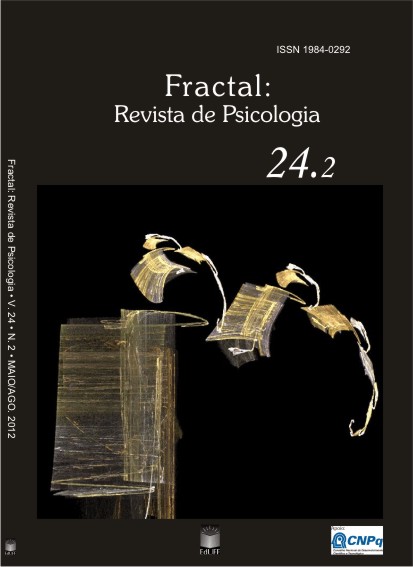Idealização e onipotência na juventude contemporânea: a drogadicção como ilustração
Palavras-chave:
Juventude contemporânea, Idealização, Onipotência, Ego ideal, DrogadicçãoResumo
O foco deste trabalho, dedicado à singularidade da juventude contemporânea, são os possíveis entraves aos processos de subjetivação na passagem da infância à vida adulta. Partindo-se da suposição de possíveis imbricações da dimensão narcísica parental com a filial, é enfatizada a formação das instâncias ideais, particularmente a relação entre ego ideal e ideal do ego, complementada por análise da idealização e da sublimação.
Como ilustração das proposições desenvolvidas, é explorado o papel das instâncias ideais, e a dominância do ego ideal na drogadicção. Considera-se que o incremento desta esteja articulado a particularidades dos processos de subjetivação dos jovens da contemporaneidade.
Downloads
Referências
ANDRÉ, J. O objeto único. Cadernos de Psicanálise, Rio de Janeiro v. 15, n. 18, p. 67-85, 1999.
BIRMAN, J. Adolescência sem fim? Peripécias do sujeito num mundo pós-edipiano. In: CARDOSO, M. R.; MARTY, F. (Org.) Destinos da adolescência. Rio de Janeiro: 7 Letras, 2008. p. 81-105.
BLEICHMAR, H. O narcisismo: estudo sobre a enunciação e a gramática inconsciente. Porto Alegre: Artes Médicas, 1985.
CARDOSO, M. R. (Org.). Adolescência e violência: uma questão de ‘fronteiras’? In: ______. Adolescência: reflexões psicanalíticas. Rio de Janeiro: NAU / FAPERJ, 2001. p. 41-53.
CARDOSO, M. R. A servidão ao “outro” nos estados limites. Psychê Revista de Psicanálise, São Paulo, ano IX, n. 16, p. 65-75, jul./dez. 2005.
CORCOS, M. Conduites de dépendance à l’adolescence. Revue Française de Psychanalyse, Paris, v. 68, n. 2, p. 469-493, 2004.
DA POIAN, C. O desamparo e a questão dos ideais. Desamparo. Cadernos de Psicanálise, Rio de Janeiro, ano 20, n. 12. p. 133-140, 1998.
EIGUER, A. La famille de l’adolescent: le retour des ancêtres. Paris: In Press, 2001.
FIGUEIREDO, L. C. Saindo da adolescência. In: CARDOSO, M. R. (Org.). Adolescentes. São Paulo: Escuta, 2006. p. 63-77.
FREUD, S. Formulações sobre os dois princípios do funcionamento mental (1911). In: ______. Obras Psicológicas Completas de Sigmund Freud. Rio de Janeiro: Imago, 1976. v. XII, p. 277-290. Edição Standard Brasileira.
FREUD, S. Sobre o narcisismo: uma introdução (1914). In: ______. Obras Psicológicas Completas de Sigmund Freud. Rio de Janeiro: Imago, 1976. v. XIV, p. 85-119. Edição Standard Brasileira.
FREUD, S. Psicologia de grupo e a análise do ego (1921). In: ______. Obras Psicológicas Completas de Sigmund Freud. Rio de Janeiro: Imago, 1976. v. XVIII, p. 89-147. Edição Standard Brasileira.
FREUD, S. O ego e o id (1923). In: ______. Obras Psicológicas Completas de Sigmund Freud. Rio de Janeiro: Imago, 1976. v. XIX, p. 23-79, Edição Standard Brasileira.
GREEN, A. L’idéal: mesure et démesure. Nouvelle Revue de Psychanalyse, 27. Paris: Éditions Gallimard, 1983. p. 255-292.
GREEN, A. Narcisismo de vida, narcisismo de morte. São Paulo: Escuta, 1988.
KEHL, M. R. A “teenagização” da cultura ocidental. Folha de São Paulo, São Paulo, 20 set. 1998. Caderno Mais, p. 7.
KNOBEL, M. A síndrome da adolescência normal. In: ABERASTURY, A.; KNOBEL, M. (Org.). Adolescência normal. Porto Alegre: Artes Médicas, 1981. p. 24-62.
LAPLANCHE, J. Vida e morte em psicanálise. Porto Alegre: Artes Médicas, 1985.
MELLOR-PICAUT, S. Idéalisation et sublimation. Nouvelle Revue de Psychanalyse, Paris, n. 27, p. 124-140, 1983.
PINHEIRO, T. Narcisismo, sexualidade e morte. In: CARDOSO, M. R. (Org.). Adolescência: reflexões psicanalíticas. Rio de Janeiro: NAU / FAPERJ, 2001. p. 69-79.
ROCHA, A. P. R.; GARCIA, C. A. A adolescência como ideal cultural contemporâneo. Psicologia: Ciência e Profissão, Brasília, v. 28, n. 3. p. 622-631, 2008.
ROCHA, Z. Esperança não é esperar, é caminhar: reflexões filosóficas sobre a esperança e suas ressonâncias na teoria e clínica psicanalíticas. Revista Latinoamericana de Psicopatologia Fundamental, São Paulo, v. 10, n. 2, p. 255-273, jun. 2007.
ROUSSILLON, R. Pluralité de l’appropriation subjective. In: RICHARD, F.; WAINRIB, S. (Org.). La Subjectivation. Paris: Dunod, 2006. p. 59-80.
WINNICOTT, D.W. Objetos transicionais e fenômenos transicionais (1953). In: ______. O brincar e a realidade. Rio de Janeiro: Imago, 1975. p. 13-44.
Downloads
Publicado
Edição
Seção
Licença
Autores que publicam nesta revista concordam com os seguintes termos:
- Autores mantém os direitos autorais e concedem à revista o direito de primeira publicação, com o trabalho simultaneamente licenciado sob a Creative Commons Attribution License que permitindo o compartilhamento do trabalho com reconhecimento da autoria do trabalho e publicação inicial nesta revista.
- Autores têm autorização para assumir contratos adicionais separadamente, para distribuição não-exclusiva da versão do trabalho publicada nesta revista (ex.: publicar em repositório institucional ou como capítulo de livro), com reconhecimento de autoria e publicação inicial nesta revista.

This work is licensed under a Creative Commons Attribution 4.0 International License.

Na medida do possível segundo a lei, a Fractal: Revista de Psicologia renunciou a todos os direitos autorais e direitos conexos às Listas de referência em artigos de pesquisa. Este trabalho é publicado em: Brasil.
To the extent possible under law, Fractal: Revista de Psicologia has waived all copyright and related or neighboring rights to Reference lists in research articles. This work is published from: Brasil.



